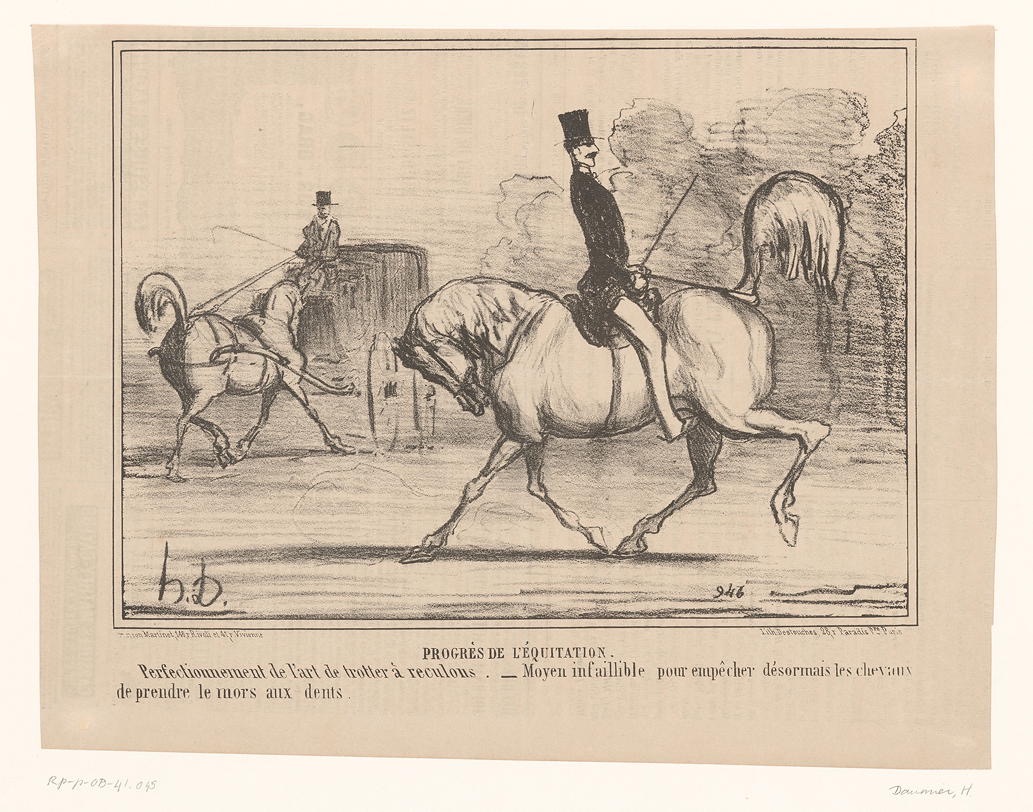ProgressReport

Honoré Daumier:
Karikatuur van een ruiter die achterstevoren rijdt
Caricature of a rider riding backwards (1856)
" … they were engaged in a diaspora away from their Eden …"
Everyone goes through a phase where they find their family an embarrassment. This often occurs during the teen years, when separation seems necessary to affect individuation. We gain the superpower capable of rendering siblings invisible lest we be associated with individuals so unlike us. One genuinely feels they were probably inadvertently switched at birth with some family that already had a color TV. Chores became beyond boring. I seemed to lose respect for myself. If Only became a near-constant refrain as I grieved over my sorry fate. I realized far too late just how fortunate I had been to have been born then, in precisely the right place at exactly the right time. I'd honestly never suspected. I never knew.
It might be true that we're all born into unfathomable ignorance. Not only do we not know, we perhaps more vehemently do not know that we do not know. We might strut around affecting understanding, and we might even impress a few even more confused than us, but we're adrift without fully comprehending it. If we're fortunate, and many of us turn out to be, we stumble upon some orienting insights. Maybe we accidentally listen and hear something. Perhaps some of that screaming at sheep our parents did finally sunk in. However we come to glimpse, we then begin to understand. For some, this shift happens relatively early in life. For others, late. Either's preferable to never, which renders us departing carrying the same ignorance with which we were born. For some, though, that might prove to be a blessing.
I never suspected the depth of my family history, though even a cursory investigation should have concluded that I hadn't spontaneously emerged from nothing. Everyone alive today has an essentially equal history, though some history's better recorded than others. Mine was unusually easy to find, though it needed some seeking to see it. It helped me enormously that The Muse began creeping around with Ancestry.com and found unexpected threads. Some of what she uncovered must remain speculative since corroborating evidence proves thin when peering into the earliest centuries. Still, the story sure seems coherent and unusually well-formed, which might suggest it's fictional because few real-life stories turn out to be anything but orthogonal to themselves. If they make sense, they must be crazy.
But the details matter little. I began my investigation into my Fambly believing that I was seeking details. Some way into the effort now, the details matter less and less. Sure, I'm delighted to learn the local color, and I could spend the next decade failing to capture the full depth of the stories. Just in my paternal grandmother's family, we uncovered almost fifty generations of stories. I have yet to mention even a quarter of them. I've felt moved to investigate even fewer. The patterns seem more significant to me now. The narrative flow and its context best justify my effort so far. History lacked only context in school for it to seem meaningful to me. Sure, I could empathize with people of the past, but I felt little connection between their world and mine. With a Fambly tree spreading back forty-some generations, I've finally discovered the context within which History might start to make sense.
More fully comprehending my paternal grandmother's Fambly story might require post-graduate study. I ache now to understand the various stages of evolution from the Roman Empire into modern Europe, from colonial outposts to the very country I live in today. The past and every future always shared the same context; as with all huge systems, it never mattered where anyone began investigating its nature. Any place turns out to be precisely just as good as any other. Any family serves as the finest introduction. Any location might provide a usable indoctrination. I realize that I had suffered from a kind of family dysmorphia, where I'd somehow convinced myself that I had been born into the wrong family at the wrong time and in the wrong place when nothing—absolutely nothing— could have ever been further from the case! I could not have been more wrong, perhaps because, like everybody, I had been born possessing unfathomable ignorance.
The Pennsylvania Dutch say Too Late Schmart, but Schmart has always come in its own time, according to its own schedule. I warmly anticipate learning more. As for this Progress Report, I'm, by my reckoning, nearly halfway through this investigation. I could continue focusing on my paternal grandmother's Fambly and easily fill up the remaining half of the story, but my paternal father's Fambly has yet to be heard from. I have fewer clues about these stories, but I've done a lot more study, including some done at the Library of Congress in Washington, DC. My father's paternal side also headed West. However, they were engaged in a diaspora away from their Eden toward some idealized replacement, understanding that going home would never become an option open to them or their children. These stories will balance the others' which sought to find their Eden at the end of The Oregon Trail.
©2024 by David A. Schmaltz - all rights reserved


